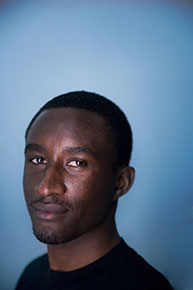Where there's peace, there's hope
If it is to succeed, the fight against HIV/AIDS in Africa must also be a war on war.

Economics and International Development student Frédéric Samvura has worked as an HIV educator in Kenyan, Tanzanian and Ugandan refugee camps.
Claudio Calligaris
This is one of the lessons that 27-year-old African native Frédéric Samvura, a U4 Economics and International Development student and HIV/AIDS educator, learned first-hand while living for three years in a Kenyan refugee camp before he came to McGill.
"It's an issue of people not being where they're supposed to be because of conflicts. I can't say that without conflict we can easily control HIV/AIDS, but conflicts aggravate HIV/AIDS and eliminate the possibility of really acting," said Samvura, who at 15 fled Rwanda with his family in the midst of the 1994 genocide to the city of Goma, in the Democratic Republic of Congo (DRC).
At 21, having completed his first year of study in economics at a Congolese university, Samvura had to relocate across borders once again, this time to the Kenyan refugee camp, where he would stay for three years.
Leaving the DRC and his family for Kenya was a precaution he thought wise to take, he said, after he learned that the political faction controlling Goma might be pursuing him because of his involvement in a student protest.
"It was scary during the demonstration, but afterwards we weren't concerned. We went home not thinking that they were going to follow up," he said.
"But later, we started getting information that they were looking for us. So we left."
Located in the desert landscape of northwest Kenya, sheltering about 150,000 refugees, the camp contrasted starkly with his abandoned home in DRC.
"[Moving] was stressful, it was a very big change. From Congo to the camp was about 2,000 kilometres. You really felt like you were far from home," he said.
While living in the camp, he saw up-close the devastation wreaked by HIV/AIDS.
He began participating in prevention campaigns, then switched to palliative care work.
"I became familiar with people who were HIV-positive and I wanted to work more closely with them," he said.
Although it was difficult at times, caring for fellow refugees with HIV was a valuable and inspiring experience.
"You expect it to be hard, but most of the time you find them with a certain strength. You feel as if you're going to meet people in despair, who have given up hope, but often they listen to your problems and encourage you."
Samvura expected to return to Congo a few months after arriving in the Kenyan camp, but the threat of persecution persisted.
He applied for and won McGill's Pilkington Scholarship, an award created to enable student refugees to resume their studies in Canada, and came to Montreal in 2004.
Last summer, Samvura won the Allan A. Hodgson Arts Internship Award, which took him back to Africa.
He worked there for a Canadian NGO as an HIV/AIDS educator in displaced person camps in Tanzania and Uganda.
Like his experience in Kenya, this three-month internship brought home to him the need for peace in the struggle against the epidemic.
"When I was in Uganda, I could see that whatever we were addressing, as long as those people were still in the camp, we would have difficulty," he said.
"But when there is peace you can do anything."

